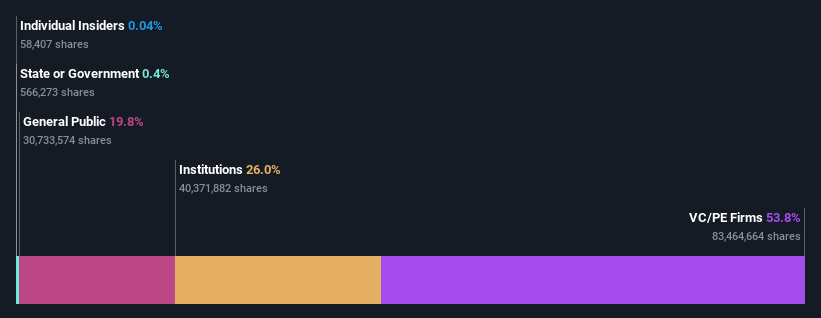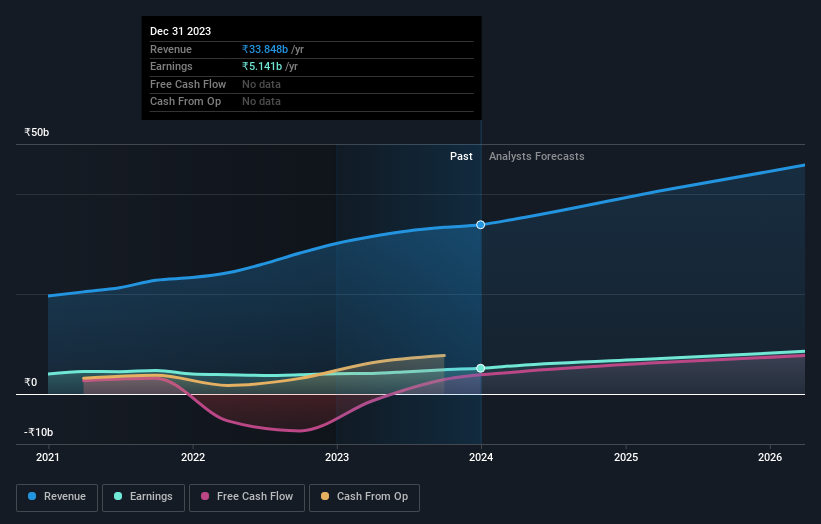Private equity firms who hold 54% of J. B. Chemicals & Pharmaceuticals Limited (NSE:JBCHEPHARM) gained 3.1%, institutions profited as well

Key Insights
- The considerable ownership by private equity firms in J. B. Chemicals & Pharmaceuticals indicates that they collectively have a greater say in management and business strategy
- KKR & Co. Inc. owns 54% of the company
- Insiders have been selling lately
To get a sense of who is truly in control of J. B. Chemicals & Pharmaceuticals Limited (NSE:JBCHEPHARM), it is important to understand the ownership structure of the business. We can see that private equity firms own the lion's share in the company with 54% ownership. Put another way, the group faces the maximum upside potential (or downside risk).
While private equity firms were the group that benefitted the most from last week’s ₹7.5b market cap gain, institutions too had a 26% share in those profits.
Let's delve deeper into each type of owner of J. B. Chemicals & Pharmaceuticals, beginning with the chart below.
See our latest analysis for J. B. Chemicals & Pharmaceuticals

What Does The Institutional Ownership Tell Us About J. B. Chemicals & Pharmaceuticals?
Institutions typically measure themselves against a benchmark when reporting to their own investors, so they often become more enthusiastic about a stock once it's included in a major index. We would expect most companies to have some institutions on the register, especially if they are growing.
We can see that J. B. Chemicals & Pharmaceuticals does have institutional investors; and they hold a good portion of the company's stock. This suggests some credibility amongst professional investors. But we can't rely on that fact alone since institutions make bad investments sometimes, just like everyone does. If multiple institutions change their view on a stock at the same time, you could see the share price drop fast. It's therefore worth looking at J. B. Chemicals & Pharmaceuticals' earnings history below. Of course, the future is what really matters.

J. B. Chemicals & Pharmaceuticals is not owned by hedge funds. Our data shows that KKR & Co. Inc. is the largest shareholder with 54% of shares outstanding. With such a huge stake in the ownership, we infer that they have significant control of the future of the company. In comparison, the second and third largest shareholders hold about 3.1% and 2.6% of the stock.
Researching institutional ownership is a good way to gauge and filter a stock's expected performance. The same can be achieved by studying analyst sentiments. There are a reasonable number of analysts covering the stock, so it might be useful to find out their aggregate view on the future.
Insider Ownership Of J. B. Chemicals & Pharmaceuticals
The definition of an insider can differ slightly between different countries, but members of the board of directors always count. Management ultimately answers to the board. However, it is not uncommon for managers to be executive board members, especially if they are a founder or the CEO.
I generally consider insider ownership to be a good thing. However, on some occasions it makes it more difficult for other shareholders to hold the board accountable for decisions.
Our most recent data indicates that insiders own less than 1% of J. B. Chemicals & Pharmaceuticals Limited. Keep in mind that it's a big company, and the insiders own ₹93m worth of shares. The absolute value might be more important than the proportional share. It is good to see board members owning shares, but it might be worth checking if those insiders have been buying.
General Public Ownership
The general public, who are usually individual investors, hold a 20% stake in J. B. Chemicals & Pharmaceuticals. While this group can't necessarily call the shots, it can certainly have a real influence on how the company is run.
Private Equity Ownership
With a stake of 54%, private equity firms could influence the J. B. Chemicals & Pharmaceuticals board. Sometimes we see private equity stick around for the long term, but generally speaking they have a shorter investment horizon and -- as the name suggests -- don't invest in public companies much. After some time they may look to sell and redeploy capital elsewhere.
Next Steps:
It's always worth thinking about the different groups who own shares in a company. But to understand J. B. Chemicals & Pharmaceuticals better, we need to consider many other factors. For instance, we've identified 2 warning signs for J. B. Chemicals & Pharmaceuticals that you should be aware of.
If you are like me, you may want to think about whether this company will grow or shrink. Luckily, you can check this free report showing analyst forecasts for its future.
NB: Figures in this article are calculated using data from the last twelve months, which refer to the 12-month period ending on the last date of the month the financial statement is dated. This may not be consistent with full year annual report figures.
New: Manage All Your Stock Portfolios in One Place
We've created the ultimate portfolio companion for stock investors, and it's free.
• Connect an unlimited number of Portfolios and see your total in one currency
• Be alerted to new Warning Signs or Risks via email or mobile
• Track the Fair Value of your stocks
Have feedback on this article? Concerned about the content? Get in touch with us directly. Alternatively, email editorial-team (at) simplywallst.com.
This article by Simply Wall St is general in nature. We provide commentary based on historical data and analyst forecasts only using an unbiased methodology and our articles are not intended to be financial advice. It does not constitute a recommendation to buy or sell any stock, and does not take account of your objectives, or your financial situation. We aim to bring you long-term focused analysis driven by fundamental data. Note that our analysis may not factor in the latest price-sensitive company announcements or qualitative material. Simply Wall St has no position in any stocks mentioned.
About NSEI:JBCHEPHARM
J. B. Chemicals & Pharmaceuticals
Manufactures and markets pharmaceutical formulations, herbal remedies, and active pharmaceutical ingredients (API) in India and internationally.
Solid track record with excellent balance sheet and pays a dividend.
Similar Companies
Market Insights
Community Narratives




